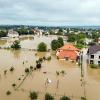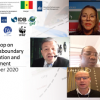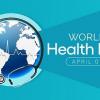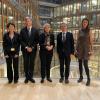News
Displaying Results 1 - 25 of 35
Directive (EU) 2020/2184 of the European Parliament and of the Council of 16 December 2020 on the quality of water intended for human consumption (recast) was adopted by the European Parliament and the Council of the European Union on 16 December 2020 and entered into force on 12 January 2021. The…
40 percent of the world’s population lives in one of the 275 transboundary river basins. Transboundary waters account for 60 percent of the world’s freshwater flows. Cooperation for the management of shared water resources is therefore crucial for economic development, peace and environmental…
Water, health, climate change and disaster risk reduction are interlinked and interdependent. For example, with climate change, floods and droughts increase in both intensity and frequency. Floods can damage water and sanitation infrastructure, disrupt essential public service provision, undermine…
While transboundary rivers, lakes and aquifers, accounting for 60 per cent of global freshwater flows, are of crucial importance for the sustainable development and political stability of riparian States, the financial means for their management, development and protection are insufficient in most…
In its follow-up to the Rio+20 process, Kazakhstan took the landmark decision to transition towards a sustainable development model. The Kazakh "Green Economy Concept" establishes a completely new development paradigm for the country.To support the transition, a four-year, €7.1-million…
As guests of the planet, we human beings can thrive only if our host environment is thriving. We are strongly connected to it, more than we probably understand and more than we probably dare to admit.
Conversely, the ways humans treat the environment has clear negative effects on our health and…
Working in several areas relevant to climate change mitigation and adaptation, UNECE took part in COP21 to showcase the practical solutions it provides for issues related to air pollution, water, transport, sustainable energy and cities.UNECE Executive Secretary Christian Friis Bach and various…
Halfway to 2030, the future we want seems to be still well out of reach. The 2023 SDG progress report for the UNECE Region, which informed discussions at the inclusive and 1000-strong Regional Forum on Sustainable Development held last week, showed that despite some bright spots, we face a troubled…
With the UN Food Systems Summit taking place next week under the auspices of the UN General Assembly (23 September 2021), we must recognize that the food systems we have built over recent decades are unsustainable. The food choices we make every day as consumers and producers of food are having a…
COP26 was a positive step forward in the fight against climate change, but as the UN Secretary General pointed out in his comments: “it is not enough. We must accelerate climate action to keep alive the goal of limiting the global temperature rise to 1.5 degrees.” The compromise deal reflects the…
The COVID-19 health crisis has caused wide-ranging socio-economic disruption worldwide. This has exposed and aggravated existing social imbalances. The pandemic has called for unprecedented measures to protect those so close to our heart: our parents, grandparents, the elderly and vulnerable.…
The 2030 Agenda with its 17 Sustainable Development Goals provides an ambitious and comprehensive framework that opens new perspectives for policymaking and international cooperation. While progress in its implementation is being made in the UNECE region, our recent statistical report showed that…
Countries of Central Asia, the Caucasus and Eastern Europe have been hit hard by the socioeconomic impacts of the COVID-19 pandemic, which threatens to derail sustainable development progress in the region.
However, there is also a stronger momentum towards regional cooperation, and countries can…
A UNECE delegation headed by Deputy Executive Secretary Dmitry Mariyasin has visited the headquarters of the European Investment Bank (EIB) in Luxembourg to hold annual consultations and strengthen partnership between two institutions.
The meeting came in the aftermath of the discussion held by…
After months of the COVID-19 crisis challenging healthcare systems and undermining economies, governments worldwide are looking for ways to jump-start the economic recovery. Without factoring in environmental concerns, recovery packages risk undermining the foundations for sustainable development, …
The UN entities in Europe and Central Asia keep forging ahead in better connecting their expertise and capacities to support the 2030 Agenda in the region. The Regional UN System Meeting (Istanbul, 20-21 May) – the joint policy and operational platform bringing together all UN entities in the…
Inland transport plays a crucial role in the global economy, connecting people, goods and services to markets and opportunities. However, the rapid growth in this sector has had a significant impact on the environment. The increasing demand for faster and more efficient modes of transport has led…
The need to digitalize information flows in international supply chains became clearer than ever during the pandemic, thanks to the reduced person-to-person contact this allows, on top of important efficiency gains. However, efforts to date have been fragmented. UNECE and its subsidiary body UN/…
As a small but important contribution to tackle climate change, UNECE has now taken the necessary measures to be climate neutral. The final step was taken on 14 October 2015, with the purchasing of Certified Emission Reductions (CERs) to offset its emissions for 2014. Upon receipt of a letter…
At the World Economic Forum Annual Meeting in Davos, UNECE Executive Secretary Tatiana Molcean highlighted the role of UNECE’s legal instruments, standards and tools in dealing with the most pressing global challenges, namely climate change, digital and green transformations, low-carbon energy…
An estimated one billion people worldwide live with disabilities. In the European Union, one person in seven among the working age population reports a difficulty with a basic activity – such as walking, seeing or hearing, lifting or carrying, sitting or standing, and remembering and concentrating…
Morocco has requested UNECE to review its environmental performance for a second time. To provide the groundwork for the review, a team of UNECE and international experts will participate in a country hybrid mission from December 2020 to February 2021, first meeting national experts by virtual…
Both innovation and Public-Private Partnerships (PPPs) are essential drivers of economic development, environmental sustainability and social inclusiveness.
The UNECE region was hit hard by the COVID-19 crisis, not only because of the health crisis itself but also, even as the threat recedes…
The economic and sanitary crisis caused by the pandemic calls for new ways of doing business. We need to digitalize data and document exchange in cross-border transport and supply chains to avoid person-to-person contacts, while increasing the efficiency of trade and transport operations. However,…
In early March this year, the UN Secretary-General called for countries to step up their efforts and turn deforestation around in order to make 2020 a ‘super year’ for nature.
This call arrived following the release of an alarming report highlighting the unprecedented speed at which ecosystems…



















